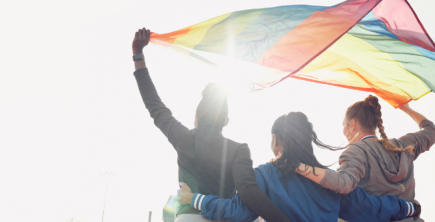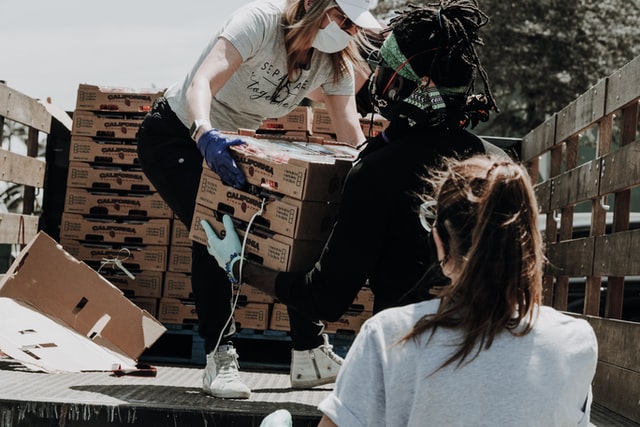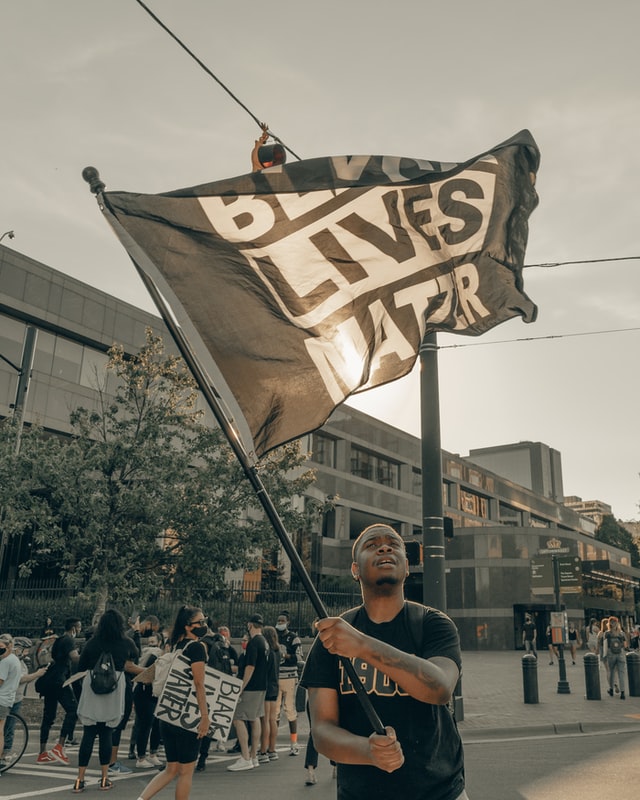
Corporate Partners

December 2019 seems like a distant memory given all that has happened in 2020. But in these uncertain times, I find myself thinking back to that month and a daylong discussion, hosted by Pledge 1%, which I took part in at the United Nations (UN) headquarters in New York. The topic was the role of corporations in helping to meet the UN Sustainable Development Goals. It was a productive day, and I learned a lot. But as I walked out of the meeting and into the city covered in a dust of snow and winter gloom, I pondered how far the world was from the UN’s vision “to end extreme poverty, reduce inequality, and protect the planet by 2030.”

The wildfires of Australia that spanned from July 2019 well into 2020 scorched 44,000 square miles of land, killed more than 30 people, and resulted in the death or displacement of approximately three billion animals. Image courtesy of Marcus Kauffman.
Little did I know that in a few months those goals and the vision behind them would seem even more remote as a series of crises shook the world. First, it was the Australian wildfires, then the COVID-19 crisis, and then the international outrage over the brutal killings of George Floyd, Breonna Taylor, and other Black Americans at the hands of police. Together, these crises have affirmed that the challenges at the heart of the Sustainable Development Goals aren’t confined to the developing world, as they often are thought to be. No, these challenges touch all people in all countries, even if their effects fall far more harshly on people who are living in poverty and dealing with the crushing consequences of structural racism and other inequities.
For those of us working in the field of corporate social impact, the gap between where the world is and where we need to be can be daunting to think about. There is so much need—and so many challenges—that it’s hard to decide where we and our companies can make a discernible difference. As I reflect back on the last several months, however, I find solace and inspiration that the Sustainable Development Goals continue to offer a powerful roadmap to guide companies in their social impact journey. And I am heartened to see how some of the corporate responses to this year’s crises reveal an evolving understanding of the most promising avenues for the private sector to tackle entrenched social problems.
Let’s start with the wildfires in Australia, which commenced in July 2019 and continued well into 2020. It was a horrific natural disaster that scorched 44,000 square miles of land, killed more than 30 people, and resulted in the death or displacement of approximately three billion animals. In response, many companies around the world launched impressive but largely uncoordinated efforts to provide direct relief to affected communities, including everything from food and housing support to boots and equipment for firefighters.

The world collectively put on their masks and worked together to keep society’s needs met during the intersecting crises we’ve seen in 2020. Image courtesy of Joel Muniz.
The wildfires were still raging in January when the World Health Organization confirmed the existence of a mysterious, coronavirus-related pneumonia in Wuhan, China. As the virus began to spread rapidly around the world, businesses jumped in with both feet to provide support to employees and communities. In contrast to the Australian wildfire response, companies rapidly recognized the importance of coordinated action through initiatives like Stop the Spread, which has secured commitments from more than 1,500 companies to join in the work of providing frontline workers with critically needed personal protective equipment and other supplies. Other corporate response efforts revealed a business community that was all in on being a part of the solution to this ongoing crisis. Then in May came the shocking murder of George Floyd.
The Sustainable Development Goals provide a tool and a platform for transforming corporate social impact in ways that ensure we are working in concert and addressing root causes like structural racism and climate change.
As Americans and people around the world took to the streets to express their outrage and demand racial justice, diverse companies stepped off the sidelines and joined in calling for—and working for—change. The flood of anguished public statements from corporate leaders about their feelings in this moment and their commitment to righting historic wrongs were a signal that something was different this time. And the business community by and large didn’t stop with just putting out statements. Companies backed up what they were saying with new commitments to invest in communities of color, support Black workers, and end practices and brands that were considered part of the problem.
As with the COVID response, many companies sought to present a united front on these issues, even as they pursued individual impact strategies. An example was the 15 Percent Pledge, in which multi-brand retailers and corporations have committed to dedicate a significant and growing proportion of shelf space and contracts to Black-owned businesses and suppliers.

A man proudly waves a “BLACK LIVES MATTER” flag high above his head during a protest decrying violence against Black Americans amidst ongoing police brutality. Image courtesy of Clay Banks.
But to me what’s most striking about the response of the business world to the injustices facing Black communities in 2020 is not the volume of commitments and actions or the unity of purpose. Rather, it is the focus of so many companies on root causes. Companies are starting the journey to learn, speak out, and take actions that show a commitment to tackling structural racism and other inequities at their core.
While we all know that those efforts are only the beginning and there is a long road ahead of us to racial equity, this new focus on addressing the root causes of an entrenched social issue marks a 180-degree shift from the response to the Australian wildfires. While natural disasters like the wildfires demand an immediate emphasis on direct relief to affected communities, they also invite those of us engaged in the work of corporate social impact to consider solutions that will prevent such disasters in the future. If we know that climate change is increasing the likelihood of these types of events, then we have to assess what more we and our organizations can be doing to protect the planet and our communities.
That brings me back to that UN meeting last December in New York. In a year when it sometimes seems like the world is unraveling at the seams, it’s important to ground ourselves and our work in a shared understanding of the immense challenges we face, as well as what it is going to take to address them in a holistic way.
Companies are starting the journey to learn, speak out, and take actions that show a commitment to tackling structural racism and other inequities at their core.
The Sustainable Development Goals provide a tool and a platform for transforming corporate social impact in ways that ensure we are working in concert and addressing root causes like structural racism and climate change. By adopting these goals as our own—and embedding them in all we do — we can go a long way in making sure we are leveraging all of our corporate assets for social good.
More than halfway through a tumultuous and trying year, it’s a thought that keeps me focused and hopeful for the future.

Read the stories and hear the voices of social change leaders fighting for justice.